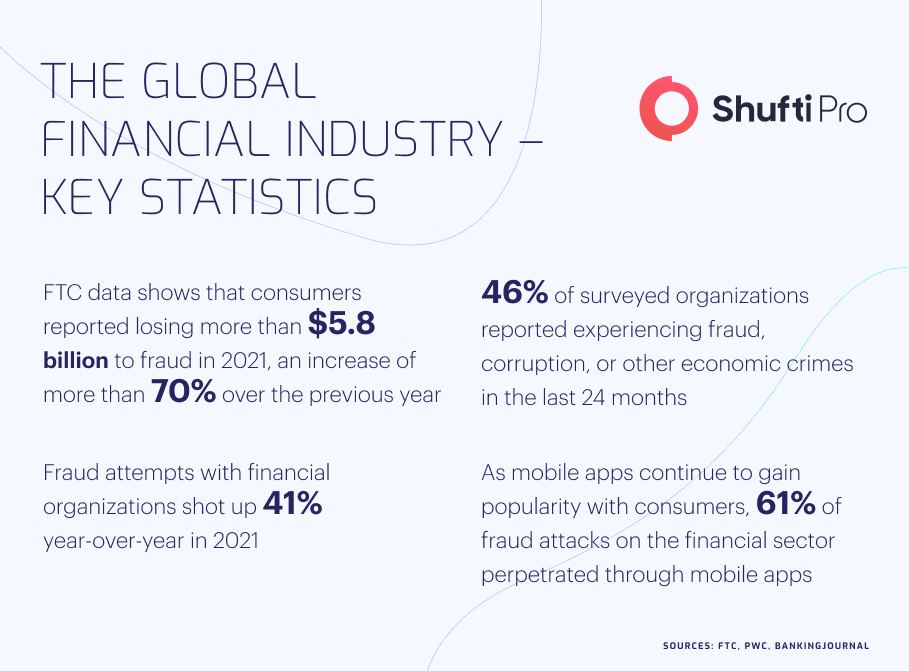
A Statistical Analysis of Prevalent Crimes in the Global Financial Industry – [2022 Overview]



BEFORE YOU GO...
Check how Shufti Pro can verify your customers within seconds
Request DemoNo thanks
Over the past few years, the financial industry has witnessed significant technological changes, and many businesses have re-designed their structure to embrace the changing innovations. Almost every industry including financial institutions, insurance companies, healthcare centers, and the travel industry are using digital mobile apps for transactions which have ultimately provided a lot of ease to users. Currently, the global financial industry has an overall market of $25,839 billion which has increased at the rate of 10.8% compared to the previous year and it is expected to reach $37,343 billion by 2026.
Due to the high stakes of money involved and the absence of robust identity verification systems, criminals have started exploiting the loopholes and inflicting financial losses on the users. Although the whole financial sector has adopted a rigid approach toward scammers, fraudulent activities are still prevalent, making enough room for criminals to get involved in a variety of scams. It is estimated that digital fraud attempts on financial companies were increased by 150% in 2021, making them highly vulnerable to financial crimes particularly money laundering, terrorist financing, and identity fraud.
Since the COVID-19 pandemic, the trend of using online services has increased to a large extent, and now when the spread of the virus has slowed, users have prioritized finding remote options instead of visiting offices. It has been found through a survey that 75% of new users started using mobile apps and websites to perform their financial transactions during the pandemic. Economic experts predict that in the next coming years, the use of cash will be replaced by cashless transactions, which will be a milestone in the digital revolution. This is the primary reason that all businesses are now preferring to adopt the online model, which has resulted in increased use of e-commerce and other digital services.
Going further, cryptocurrency has altogether changed the financial industry providing users to carry out their transactions through a decentralized system. In 2021 alone, the overall crypto market touched $1.5 trillion, with an expectation of increasing at a CAGR of 7.1% in the coming years. Although the year 2022 has not been profitable for crypto investors, experts have predicted that it will be back on the track by the first half of 2023. Based on the statistics, it would not be wrong to say that the global digital financial industry is increasing unprecedentedly and will soon overtake the whole economic system.

Although the most innovative technologies are prevailing in the financial industry, criminals are also using advanced techniques to exploit loopholes and get successful in abusing the system. However, the rising number of financial crimes is becoming a global concern, provoking regulatory authorities to take strict actions and make it secure for the users.
Let’s have a look at the facts and figures of the most prevalent crimes associated with the global financial industry:
Money laundering is a global issue that has created a myriad of problems for the economic system, further giving rise to terrorism as well. It is estimated that every year money laundering costs 3% to 5% of the global GDP, which is more than $2 trillion.
The majority of the jurisdictions have made it illegal in their countries and legislated multiple laws to monitor financial crimes.
In the wake of rising money laundering cases, a large number of banks involved in this heinous crime were fined more than $10 billion in 2020 for not complying with the global Anti-Money Laundering (AML) regulations. It is expected that securing the financial sector through AML screening measures will cost at least $1.77 billion by 2023.
Identity theft is another high-profile crime that has raised the alarm for the global regulatory authorities. The fraudsters have evolved strategically and are using advanced techniques to infiltrate the system stealing the identities of sophisticated users. Federal Trade Commission has reported that in the US alone, identity theft cases registered in 2021 were 22% more than in 2021, costing users $56 billion.
The criminals further use the stolen identities to carry out multiple scams, particularly fake bank account openings, credit card scams, and money laundering, while the real user remains uninformed about any such activity. As per the report by Payment Intelligence Company, the global cases of identity fraud in the financial sector increased by 109% in 2021 as compared to the previous year.
Credit card fraud is among the leading scams which are highly frequent in financial organizations. Criminals steal the credit card details of users and further abuse these details to carry out financial transactions. In 2021 alone, the companies lost $32 billion, and it is projected that this amount will increase to $38 billion by 2027. This type of scam is widespread in the US and accounted for 36% of all credit card fraud in 2021.
The concept of digital financial transactions has increased globally, overall increasing the crime percentage. The whole financial sector of all jurisdictions is facing threats in the form of monetary scams urging the global regulatory authorities to find a viable solution against it. Financial Action Task Force (FATF), the primary body fighting money laundering and terrorist financing, has termed fraud in the financial sector a huge threat to the existing economic system. It has also advised all the member-states to form a comprehensive framework efficient enough to counter these crimes and make the industry a secure place for users.
Let’s have a look at some of the latest statistics related to financial organizations’ fraud in the United States and the United Kingdom:
Combating fraud in the financial sector is crucial to ensure transparency in the digital economic system. Identity verification services have provided the most optimum solution for financial industry through which companies can verify the true identities of their users and maintain a record of them. Shufti Pro’s KYC services offer the digital sector to implement stringent IDV services and report any suspicious activity to law enforcement.
Additionally, Shufti Pro’s AML screening solution has access to 1700+ sanctions lists and generates results in seconds with a ~99% accuracy. It is powered by an AI algorithm that will counter criminals ensuring safety and security for other sophisticated users.
Are you ready to find out KYC/AML solutions for the financial sector?